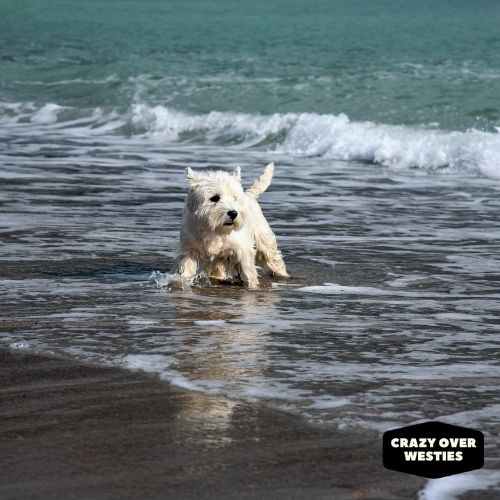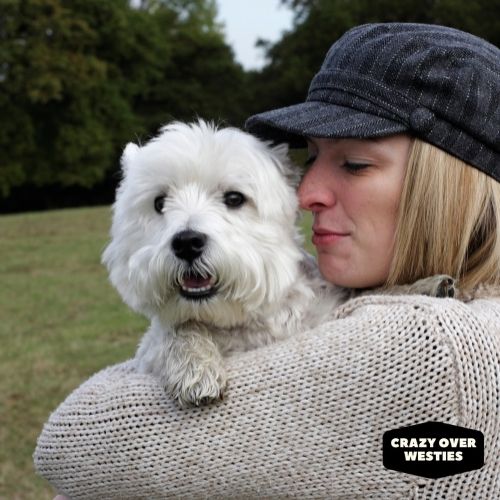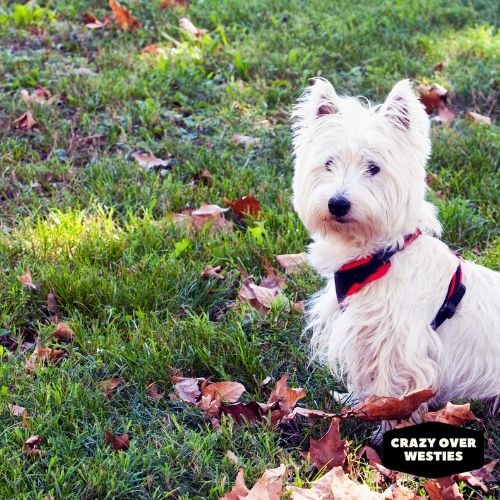As with any pet owner, they like their westies to be happy, healthy, and content. Therefore they should ask this important question. What do westies like?
We hope that the following will help answer important questions that you would like to know.
This post will take around 4 minutes to read. If you are in a hurry, we have included a table of contents so you can see at a glance what the content is.
Table of Contents
Do Westies Like Cats:

West Highland White Terriers are usually more tolerant of cats than other terrier breeds. However, they were originally bred in Scotland, to chase prey animals and tend to pursue smaller animals that come into their territory.
The Westie will only get along with a cat if:
1. They were raised together as kittens.
2. The Westie has been introduced to the cat as an adult and has since formed a loving, playful bond with it over a period of time.
Do Westies Like To Swim:

Yes, a Westie can swim, but it’s not their natural ability. They’re not good at swimming and need short bursts of calm water. They should always be supervised by their owner or a responsible adult.
Westies love to swim despite the fact that they’re not natural at it. The dog’s short legs and thicker body don’t matter as much as when the goal is hunting and digging.
Do Westies Like Long Walks:
As with any dog, the amount of exercise a Westie needs will depend on factors such as their age and fitness level.
West Highland Terriers are very energetic and require lots of exercise. If their energy is not handled correctly, it could lead to mischievous behaviors such as being destructive.
Westie owners should aim for around 45 minutes to an hour of walking their dog per day, 2-3 times. If your dog is older you should reduce the amount of daily walking accordingly.
Do Westies Like To Cuddle:

Westies are energetic but not always in the mood for cuddles. They prefer exploring outdoors, digging, and chasing squirrels to sitting quietly on an owner’s lap.
Westies aren’t the typical lapdog. They’re very active and love to be doing something all the time. Westies want to be scratched and petted when they are tired.
They often prefer to spend time alone and do not get lonely easily. However, Westies have a sensitive nature and need a lot of affection from their owner. They will gladly cuddle with you to get that instantly, so it’s good to take them for walks also.
Do Westies Shed:
West Highland terriers are great family pets because they shed very little and require less grooming than other breeds (like Shih Tzus and poodles). You’ll find it easy to own and maintain one!
Many people hesitate to get a dog because they know that it will release pet dander and increase their allergies. In reality, the grossest thing about pet dander is that it is made from dead skin cells and can be found floating in the air and settling on furniture
Do Westies Like Cold Weather:
West Highland Terriers were bred to be small but rugged rat hunters. They’re resilient and tenacious dogs and can survive in various climates.
Westies are very social and love to spend time with people. They also enjoy time with their family which can make them seem like a lapdog even though they’re not. Some Westies do prefer being outside, but it’s important that they still get time to hang out inside also.
Do Westies Like To Dig:

The short answer is yes. However, in order to understand the West Highland White Terrier’s history with digging, we have to go back to its roots in Scotland. Originally bred for the hunt, Westies typically have short legs and a wide stance that allow them to move quickly through holes and tunnels.
They were trained over generations to search out and flush out foxes and other small animals from their burrows. This behavior becomes ingrained in the body, preparing it for that specific task.
Look at Why Do Westies Dig for more information.
Do Westies Like Other Dogs:
West Highland White Terriers are great family pets. They get along well with other cats or dogs, they are very social animals who love being around people. But because of their hunting instincts, young children might not be the best companions.
Westies are a very popular breed of dog that is known for their friendly personality. They have a strong bond with their owners and will do anything to please them. They are also known for being good with other dogs, but they might not be so great with cats or small animals.
Do Westies Like Toys:
Westies love squeaky toys and will enjoy having plenty around to play with. This will help reduce the chances of them chewing on your furniture instead. Make sure to choose durable rubber/latex toys for this reason. They can play with them for hours.
Do Westies Like Snow:

Westies love to spend time outside and snow is just as fun for them. They’ll run around, play in it and even try to bury their noses in the snow because they can’t get enough of how it smells.
This is a great way to give your dog plenty of exercise, and it only takes about 15 minutes. Go for walk around the block and then return home. Take your dog’s ball or treats with you. Start at one end of the yard and make a narrow pathway that goes under benches in your garden and between trees. Throw the ball or drops treats every now and then
Conclusion:
West Highland White Terries are one of the most lovable breeds on the planet. They are small, humble, and clean. They share a history with the Scottish, Cairn, and Skye terriers. They all belong to the same breed of dog.
They’ll even boost your mood with their love and affection. With a dog, you’ll always have a good mate for playtime. Their cuddles will do wonders to comfort you from all of your problems. And don’t forget the morning walks to give you a dose of life and positivity – they’re great for your physical and mental health!
—————————
Disclaimer: All material on this website is provided for your information only. It may not be construed as medical advice. No action or inaction should be taken based solely on the contents of this information. Instead, readers should consult appropriate health professionals or veterinarians on any matter relating to their pet’s health and well-being. The publisher is not responsible for errors or omissions.

